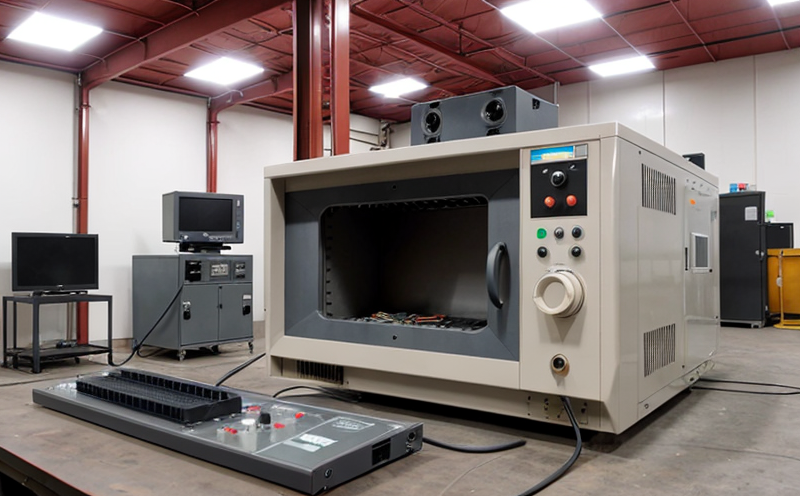UL 61010 Industrial Measurement Equipment Safety Testing
The UL 61010 standard is specifically designed to ensure that electrical equipment used in the measurement and control of industrial processes meets stringent safety requirements. This standard applies to a wide range of industrial instrumentation, including process analyzers, sensors, data loggers, and other devices used for monitoring and controlling industrial environments.
UL 61010 establishes essential characteristics that are necessary to ensure the safe use of electrical equipment in measurement applications. The testing criteria encompass various environmental conditions, mechanical stresses, and electrical requirements that can impact the performance and safety of such equipment. This includes tests for electromagnetic compatibility (EMC), electrical insulation, overvoltage protection, and more.
UL 61010 covers a broad spectrum of industrial measurement equipment used in various sectors, including manufacturing, oil & gas, chemical processing, power generation, and more. The standard aims to prevent accidents, injuries, and property damage by ensuring that the devices meet rigorous safety requirements before being deployed in harsh industrial environments.
The testing process for UL 61010 involves several stages, each designed to assess different aspects of the equipment's performance and safety:
Firstly, there is a thorough review of the product documentation, which includes electrical diagrams, mechanical specifications, and other technical data. This step ensures that the design meets all relevant standards before any physical testing begins.
The second stage involves environmental tests, where the equipment is subjected to various conditions such as temperature cycling, humidity exposure, and vibration. These tests are crucial in ensuring that the device can operate reliably under real-world industrial conditions. For instance, a process analyzer used in an oil refinery must function accurately even when exposed to extreme temperatures and vibrations.
Electromagnetic compatibility (EMC) testing is another critical aspect of UL 61010 compliance. This involves assessing the device's ability to operate without causing electromagnetic interference (EMI) to other nearby equipment, as well as its resilience against external EMI. In industrial settings, where numerous devices are interconnected and sensitive to interference, this is particularly important.
Overvoltage protection tests are also a key component of UL 61010 testing. These tests evaluate the device's ability to withstand voltage spikes that can occur in industrial environments due to lightning strikes or other transient events. Ensuring robust overvoltage protection is essential for preventing damage to sensitive electronic components and ensuring continuous operation.
Mechanical stress testing is conducted to ensure that the equipment can endure the physical stresses encountered in an industrial setting. This includes tests for shock resistance, drop testing, and durability under load conditions. For example, a data logger used in a manufacturing plant must be able to withstand frequent handling and harsh environmental conditions without failing.
The final stage involves functional testing, which ensures that the equipment operates correctly and safely within its intended application. This includes checking the accuracy of measurements, response times, and other critical performance parameters. For instance, a pH sensor used in a chemical plant must provide accurate readings to ensure proper process control.
Industry Applications
The UL 61010 standard is widely recognized for its comprehensive approach to ensuring the safety of industrial measurement equipment. This makes it an essential requirement in numerous industries where precision and reliability are critical:
- Manufacturing: Ensures that production lines operate safely, reducing the risk of accidents and downtime.
- Oil & Gas: Protects workers and equipment from hazardous conditions in exploration and extraction processes.
- Chemical Processing: Guarantees accurate measurement of chemicals for safe handling and processing.
- Power Generation: Ensures the safety of personnel and equipment during energy production.
International Acceptance and Recognition
The UL 61010 standard is highly regarded globally, and its compliance is often a prerequisite for market access in many countries. The standard's acceptance extends to various international standards such as IEC 61326 and EN 61326:
- IEC 61326: International Electrotechnical Commission standard for electrical equipment used in measurement, control, and laboratory applications.
- EN 61326: European Norm that aligns with IEC standards for safety of industrial process measurement instrumentation.
Compliance with UL 61010 is not only a requirement in the United States but also in many other regions, including Europe and Asia. This widespread acceptance ensures consistent quality and safety across different markets.
Environmental and Sustainability Contributions
The UL 61010 standard plays a crucial role in promoting environmental sustainability by ensuring that industrial measurement equipment operates reliably and safely under various conditions. By reducing the risk of accidents, damage to equipment, and waste from premature failures, this standard contributes significantly to operational efficiency and resource conservation:
- Reduced Downtime: Ensures continuous operation of critical industrial processes.
- Safety Enhancements: Minimizes risks associated with electrical equipment in hazardous environments.
- Energy Efficiency: Accurate measurement and control contribute to efficient energy use in industrial operations.





